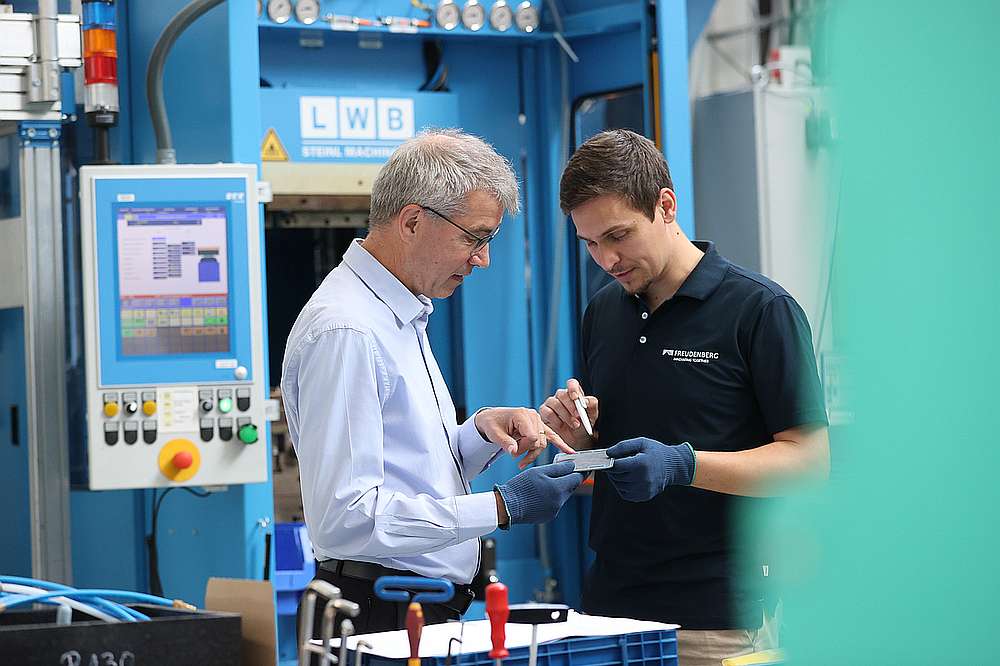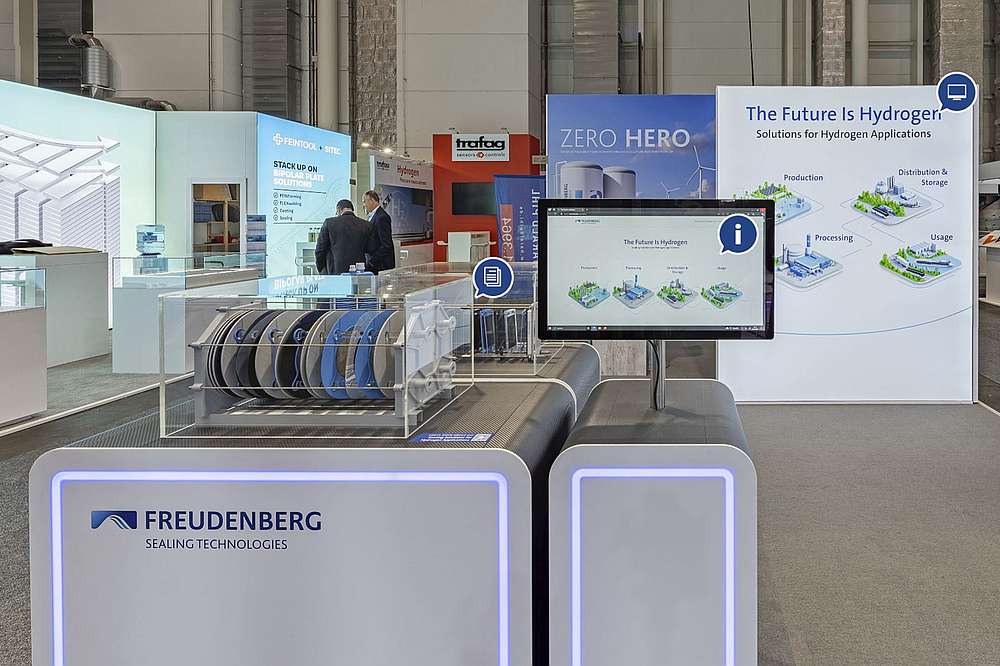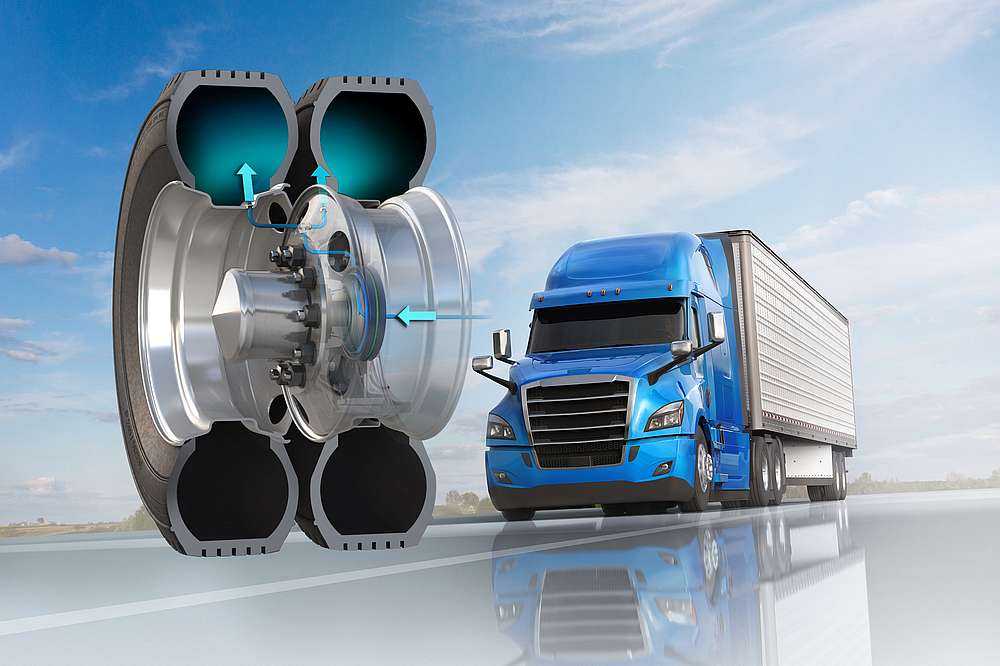Obtain news and background information about sealing technology, get in touch with innovative products – subscribe to the free e-mail newsletter.
15.06.2021
For Sustainable Yachting
With over 10,000 ships worldwide, the yacht industry is a significant part of the maritime economy. Its customers value innovations, new technologies and environmental protection. After all, yachts are often near residential coasts, where factors such as emissions of any kind are delicate issues. Just as in larger ships that prioritize range and route flexibility, electricity must be ruled out as an energy source due to the heavy weight and low volumetric energy density of battery systems. For these ocean-going vessels, fuel cell propulsion is a superior choice.
This is why Lürssen and Freudenberg have defined a joint technology roadmap for yachts without combustion engines. The two companies are already collaborating on the “Pa-X-ell 2” project, in which other partners such as Carnival Maritime, DNV, besecke, DLR, EPEA and Meyer Werft are pushing ahead with the development and testing of a hybrid energy system with a new generation of fuel cells for yachts and passenger ships suitable for the high seas.
“Our strategic cooperation with Lürssen is another milestone in our fuel cell strategy. This is how we are making a significant contribution to sustainability in the maritime sector,” says Claus Möhlenkamp, CEO of Freudenberg Sealing Technologies. “Our partners in the heavy-duty sector appreciate our strategic focus on fuel cell systems with high durability and efficiency.
“Our technical expertise, combined with high value creation, especially on a cell level, is a convincing asset,” Möhlenkamp adds. “Following the collaboration with Meyer Werft in the cruise sector, our cooperation with Lürssen is proving that our technology is generally transferable to all maritime sub-segments.”
The partnership also brings important opportunities to Lürssen. “Our cooperation with Freudenberg brings us a big step closer to our goal: an emissions-neutral Lürssen yacht,” explains the shipyard owner, Peter Lürssen. “We look forward to working with Freudenberg, the technology leader in maritime fuel cell systems.”
Maritime Fuel Cell System Based on Methanol
The fuel cells, which have been uniquely developed for maritime applications, will temporarily substitute the ship’s conventional diesel generators in the first joint ship installation. This allows the yacht to anchor for 15 days or cruise 1,000 miles without emissions – an important added value for the ship owner.
The system uses Freudenberg’s methanol-operated, maritime fuel cell system with integrated fuel reforming, which received the “Approval in Principle” from the DNV GL classification society at the end of 2020: Steam reforming of methane is used to produce hydrogen directly in the system, which then reacts with oxygen from the air in the fuel cell, generating the electric energy required for the propulsion as well as the ship’s electrical system. Ship owners benefit from the fuel cell system’s higher efficiency, when compared with a combustion engine, and thus enjoy lower fuel consumption and reduced maintenance costs. The ships travel nearly without sounds or vibration, which is particularly important for the regions that serve as destinations for the yachts.
Another component of the collaboration is the commissioning of an innovation laboratory at Lürssen, where the integration and operation of Freudenberg’s maritime fuel cell systems are simulated on board a yacht operated with methanol. The optimal hybridization between fuel cells and batteries will also be analyzed here.
The Goal Is to Decarbonize the Maritime Fleet
In addition to the Truck and Bus segment, equipping ships with fuel cell systems is one of Freudenberg’s strategic goals, explains Dr. Manfred Stefener, Vice President Fuel Cell Systems at Freudenberg Sealing Technologies: “Our aim is to decarbonize the entire maritime fleet. Thanks to the integration of fuel cell battery solutions, we will supply all of the energy requirements of ships, including those of the main propulsion system. This hybridization strategy makes it possible to sustainably and cost-efficiently achieve the required installations in the double-digit, megawatt range for every ship. Freudenberg provides these solutions from a single source.”
Right-sizing of fuel cell and battery as well as fuel flexibility are key success factors for Freudenberg: It is one of the few companies with the technological capabilities to manufacture both fuel cells and high-performance batteries for heavy-duty applications within its own production facilities – a value-added benefit to customers. “This allows us to directly influence the cost, quality and technical performance of the systems,” notes Stefener.
In the future, continuously operating fuel cells will cover the base load in shipping. Batteries will provide the power needed for peak performance, for example, during maneuvering. “This perfectly coordinated interaction increases the lifespan of all system components while also optimizing the efficiency of the overall system,” Stefener says, explaining the right-sizing approach. “Additionally, it allows for smaller configurations of the total installed capacity, which offers significant space and cost benefits.”
Greatest Possible Flexibility in the Fuel Selection
Freudenberg’s maritime fuel cell systems are also advanced where fuel flexibility is of concern. The fuel cell systems can be used optionally with pure hydrogen, methanol or liquefied natural gas (LNG). In view of the high demands on range and route flexibility of the world’s maritime fleet, methanol fuel, in particular, which can already be produced in a completely emission-neutral manner, offers enormous potential for reducing emissions. For methanol and LNG, Freudenberg uses innovative reformer technologies that are directly integrated into the maritime fuel cell systems. The reformer technology produces hydrogen chemically and is located inside the hydrogen supply module. Freudenberg’s downstream modular and standardized fuel cell modules can convert reformed hydrogen from both methanol and LNG into electricity and heat. They can also be operated with pure hydrogen.
“Now we can offer our customers the greatest possible flexibility when they select their fuel,” Stefener concluded.
Ulrike Reich
Head of Media Relations & Internal Communications
Telephone: + 49 (0) 6201 960 5713
ulrike.reich@fst.com chevron_rightDownload Press Release
News Service
You can subscribe to the Freudenberg Sealing Technologies news alert service, bringing you the news as soon as they are published. You can always unsubscribe from this service.
Subscribe now! chevron_rightFurther Articles With These Taggings

First Hand News
Best of all, keep up with the latest developments
with the Freudenberg Sealing Technologies newsletter.













